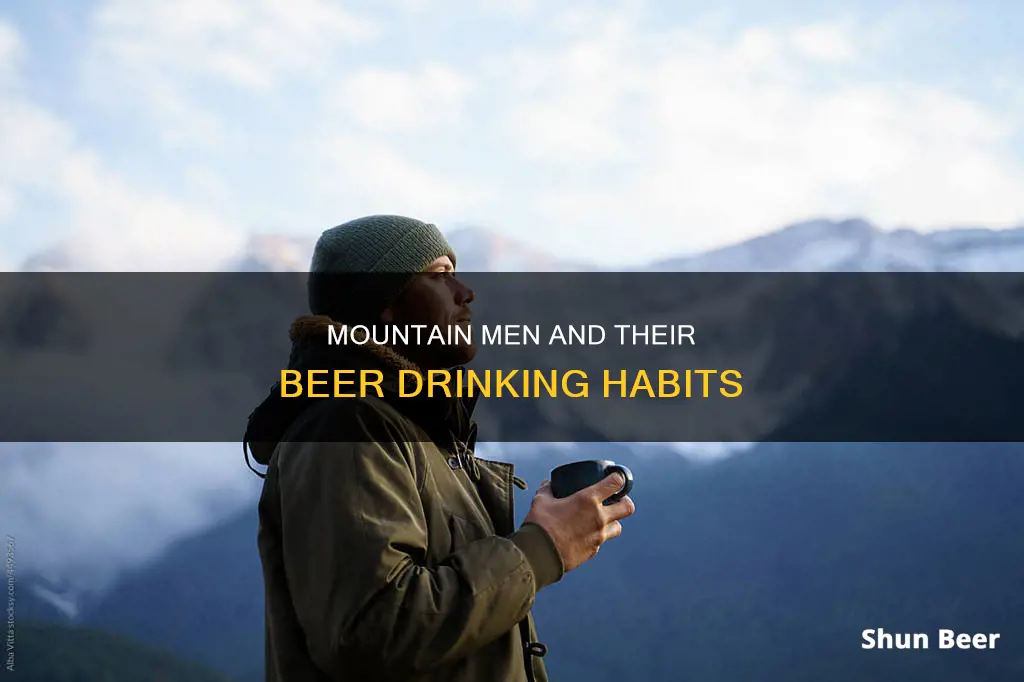
Beer is one of the oldest human-produced drinks, with evidence of its existence dating back to ancient Egypt and Mesopotamia. The drink has since spread globally, with breweries now operating on every continent.
Mountain Men of the early 19th century were a group of explorers of European descent who were the first to traverse the American West. Their diet consisted largely of meat, including buffalo, deer, and bear, as well as wild roots and berries. While their diet was mostly meat-based, they also consumed tea and coffee when available, and milk when they could get it.
So, did Mountain Men drink beer? While there is no direct evidence to suggest that beer was a staple drink for Mountain Men, it is likely that they did consume it on occasion, especially during trading and at rendezvous, where alcohol was commonly used.
| Characteristics | Values |
|---|---|
| Mountain Men diet | Meat, meat and more meat, or whatever was available |
| --- | --- |
| Food preservation methods | Salting, drying |
| Preferred drinks | Coffee, tea |
| Alcoholic drinks | Mountain Cider, Bitters, High Wine, Firewater, Trade Whiskey, Taos Whiskey |
| Beer | Not mentioned |
What You'll Learn

Mountain Men's diet consisted of meat, meat, and more meat
The diet of the Mountain Men, or the American Mountain Men of the early 19th century, consisted of large quantities of meat. Their diet was largely dependent on what was available, and they would eat whatever they could find.
The Mountain Men were the first people of European descent to explore the western regions of the United States. They were clad in buckskin clothing of their own manufacturing and traversed the continent using only the store-bought goods they obtained once a year. They had to glean their sustenance from natural sources they found in the wild. Their diet was therefore largely dependent on what they could hunt.
The most common meat in the Mountain Men's diet was buffalo. They also ate deer, elk, bear, mountain sheep, antelope, and wolf. In extreme circumstances, they would eat dog, horse, or mule. They would also eat all parts of the animal, including the meat, tongue, liver, and intestines.
The Mountain Men also gathered wild roots and berries to supplement their diet. They ate Pomme Blanc (White Apple), Commote, prickly pear cactus, and prairie potatoes. They also gathered greens, serviceberries, and box-elder sap.
In addition to meat, the Mountain Men also ate breadstuffs such as biscuits, flapjacks, Bannock or fry bread, and cornbread. Common vegetables included beans, hominy, rice, and peas. They also drank coffee and tea when available, and occasionally milk.
The Mountain Men's diet was often monotonous, and they would eat the same foods for months at a time. Food was often preserved by salting or drying, so cooking was a process of making these foods edible and, if they were lucky, palatable.
Drinking Beer with Amoxicillin: What You Need to Know
You may want to see also

They also ate whatever was available, including moccasins and rawhide straps
The diet of the Mountain Men was largely meat-based, but they would eat whatever was available. Most foods were preserved by salting or drying, and cooking was often a process to make these foods edible, and palatable.
Mountain Men would eat the same foods for months on end, and there was no room to be fussy about what they ate. Their journals often mention eating moccasins, saddles, and rawhide straps during lean times. This may be where the myth originated that Mountain Men softened their leather by chewing it.
Mountain Men would also eat the occasional fresh game, including buffalo, which was a staple, and other meats such as deer, bear, and elk. They also ate fish, including salmon, and would gather wild roots and berries, such as the pomme blanc (white apple), commote, and serviceberry. They also gathered greens, and ate prickly pear cactus.
Beer Caramelizer: How Does It Work and Why?
You may want to see also

They preferred coffee and tea when available
Coffee and tea were the preferred drinks of the Mountain Men when available. Large quantities of both were shipped to the mountains for rendezvous. Inventories show that loose tea (Young & Hyson) was taken to rendezvous.
Mountain Men were always on the move, and their diets consisted of whatever was available. Their food was often salted or dried to preserve it, and cooking consisted of attempting to make the food palatable.
Coffee could be extended or substituted using roasted chicory. Chicory was originally imported to North America by the early French fur traders, and today it grows wild throughout the continent. To "Drink the muddy water" became a tradition with the Indians and traders prior to dickering on furs and goods. In the early 1800s, coffee was available in the form of green beans, which needed to be roasted (burnt) and then crushed before brewing.
Wild Cherry Bark Tea was also a common drink among Mountain Men, as noted in the journal of Rufus Sage, a Mountain Man who headed west in the early 1840s. Sage records many of the wild foods he enjoyed, and he mentions the positive effect Wild Cherry Bark Tea had on his health.
Drinking Beer in Front of Cops: Is it Legal?
You may want to see also

Alcohol was a significant element in the fur trade
During the fur trade, alcohol was used as a tool to assure large profits. Alcohol was consumed prior to and during trading with fur gatherers, whether they were free trappers, company men, or Indians. Alcohol was most abundant around forts and trading posts, and at rendezvous.
Alcohol packed for rendezvous was extremely high proof. Once at a rendezvous or trading post, the alcohol was diluted with water, increasing the volume of the product and, therefore, the profits. For example, Rufus Sage records in his book, "Rocky Mountain Life", that on one occasion an Indian woman drank a cup of undiluted alcohol and died of alcohol poisoning within a few hours.
Alcohol was also used as an anesthetic for someone badly injured, or for other medicinal purposes.
Enjoying Beer While Watching Champions League Games
You may want to see also

Beer is one of the oldest human-produced drinks
The written history of ancient Egypt and Mesopotamia also records the use of beer, and the drink has since spread throughout the world. A 3,900-year-old Sumerian poem honouring Ninkasi, the patron goddess of brewing, contains the oldest surviving beer recipe, describing how to produce beer from barley bread. In China, residue on pottery dating from around 5,000 years ago shows that beer was brewed using barley and other grains. Beer may also have been known in Neolithic Europe as far back as 5,000 years ago, and was mainly brewed on a domestic scale.
Beer was often consumed as part of religious practices and rituals. In ancient Mesopotamia, brewing was a well-respected occupation, and the only profession that derived social sanction and divine protection from female deities. Beer was also vital to all the grain-growing civilisations of Eurasian and North African antiquity, including Egypt. During the construction of the Great Pyramids in Giza, Egypt, each worker received a daily ration of four to five litres of beer, serving as both nutrition and refreshment.
The process by which beer was discovered is a matter of debate. Author Thomas Sinclair suggests that the discovery of beer may have been accidental. Ancient peoples would soak grains in water and make a porridge or gruel, as grain was hard to digest on its own. They would heat the gruel and leave it throughout the day, and fermentation would occur as yeasts settled on the mixture. The low oxygen levels would then cause the yeast to digest sugars by anaerobic respiration, producing ethanol (alcohol) and carbon dioxide, and thus creating beer.
Today, the brewing industry is a global business, consisting of several multinational companies and thousands of smaller producers. More than 133 billion litres of beer are sold per year, generating total global revenues of $294.5 billion in 2006. The global beer market is projected to grow by $148.43 billion between 2024 and 2028.
Beer and Gym: Drinking After a Workout, Good or Bad?
You may want to see also
Frequently asked questions
Yes, Mountain Men drank beer. When available, coffee and tea were the preferred drinks of the Mountain Men, but they also drank alcohol.
Mountain Men generally ate meat, meat, and more meat. Their diet included deer, bear, mountain sheep, and buffalo.
Mountain Men also ate biscuits, pancakes, fry and corn bread, beans, hominy, rice, and peas. They also gathered wild roots and berries.
Mountain Men preserved their food by salting or drying it.
Mountain Men drank coffee, tea, milk, Mountain Cider, Bitters, and High Wine.







